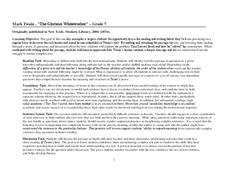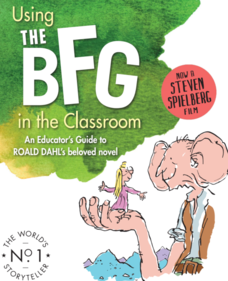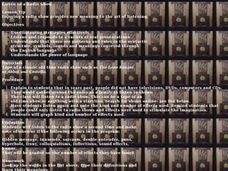Curated OER
Humor and Irony in Eudora Welty's The Ponder Heart
Students demonstrate an understanding of humor in writing, specifically the use of irony (verbal, situational, and dramatic). They evaluate an event from his or her life that lends itself to a humorous retelling, and demonstrate an...
Curated OER
Jokes
If you feel like giving your lecture students a chuckle, this entertaining presentation is worth your time. Exploring humor in various types of jokes, the slides include examples of license plate jokes, lightbulb jokes, singlets, and...
Curated OER
The Glorious Whitewasher
Young readers can be exposed to the literary works of Mark Twain as they interact with challenging text and gain experience by reading the complex passages of chapter two "The Glorious Whitewasher" from his famous book, The Adventures of...
Curated OER
Tone and Mood
How are mood and tone similar? Different? Help your readers understand the difference between the two with this helpful guide. On the first page, they read the definition for both tone and mood and identify words that are describe each....
Curated OER
Short Story Lesson Plan
Students read and discuss the short story, "The McWilliamses and the Burglar Alarm," by Mark Twain. They assume the role of the main characters in the story and write a humorous letter of complaint using a business letter format. They...
Curated OER
Poetic Elements
Poetry is all about sound and rhythm. The sound of the words, the rhythm of the lines, and the emotional atmosphere created by these elements and the literary devices poets use, compress whole stories into a few stanzas. The specialized...
Curated OER
Satire
Learners will greet the world with a more critical eye after examining the forms, functions, and varying degrees of satire in this presentation. Defining satire as a whole, as well as identifying examples of different forms of satire in...
Curated OER
Hyperbole!
Learn all about hyperbole with this quick PowerShow presentation. The nine slides are packed full with clear examples, and there are opportunities for the audience to create some examples of their own. It's quick and informative!
Curated OER
Everyone's a Critic: Analyzing Sitcoms as Cultural Texts
Start by defining the word sitcom with the goal of launching a discussion. What exactly is a sitcom? How is a sitcom different from sketch comedy, drama, and reality television? Class members give examples, remember storylines...
Curated OER
The Pillsbury Doughboy
Mourning the death of the Pillsbury Doughboy (from a yeast infection and pokes in the belly), this presentation discusses the use of puns, metaphors, and polysemes. The slide show continues by discussing other popular metaphors and...
Curated OER
Make Up Your Story
Putting together an interesting story can be hard, but this set of worksheets will guide your writers into the depths of their own creativity as they characterize both their main character and villain. Using humor to keep learners...
K12 Reader
Adventures with Alliteration! - Adjectives
Have hearty humor with a handy, helpful handout! Kids work on their alliteration skills with a figurative language worksheet that focuses on alliterative adjectives and phrases. After kids add nouns to ten adjectives, they create five...
Curated OER
Editorial Cartoons
Do your classes love reading and drawing cartoons? Middle schoolers read an editorial cartoon from a newspaper. They discuss the cartoonist's topic, audience, and purpose. Next, they brainstorm questions they have about the cartoon and...
Roald Dahl
Using The BFG in the Classroom
Use a resource that highlights Roald Dahl's seven tips for imaginative writing while reading The BFG. The activities encourage learners to become creative writers through finding harmony, establishing stamina, engaging in imaginative...
Curated OER
Listen to a Radio Show
Young scholars practice the art of listening. In this listening skills instructional activity, students listen to an old-time radio show and identify hidden messages, innuendo, sarcasm, double entendres, puns, hyperbole, irony,...
Curated OER
Is That a Fact? A Comment on Modern Fables
Students complete literary analysis for modern fables or urban legends. In this modern fables lesson, students listen to an urban legend and discuss it. Students then research urban legends online and write their own urban legend.
Curated OER
Why Thank You!
Fifth graders listen to a read aloud of Patricia Polacco's, Thank You, Mr. Falker! students examine the use of voice in the book, discuss the writing and theme ideas. They write a thank you not to their hero.
Curated OER
Author’s Purpose
In this literary elements worksheet, learners respond to 18 short answer and multiple choice questions regarding the author's purpose in "A World Made Beautiful by Dzine."
Curated OER
Adrian Mole - Diary
Students read a passage from the Diary of Adrian Mole in their groups and then discuss the different characters of the story. They bring the scene to life by setting the scene, selecting who in the story would be involved in their scene,...
Curated OER
Figures of Speech Quotes and Examples
Providing several examples of figures of speech, such as irony, paradox, and personification, this presentation could complement your lecture on pragmatic humor or humor in writing. Examples from Lewis Carroll's Alice's Adventures in...
Curated OER
Sarcasm
Learners often regard sarcasm as a "you know it when you see it" language phenomenon, leading to confusing tone and humor in student writing. This presentation not only defines sarcasm (and irony) in plain terms, it also provides many...
Curated OER
Using Cartoons and Comic Strips
Students explore cartoons and comic strips to practice a variety of language and discussion activities. They explore the themes of humor, culture, and issues in cartoons and comic strips. They draw pictures to represent the last frame...
Curated OER
Cartoons for the Classroom: Sarcasm, Irony, and Satire
Satire, sarcasm, or irony? Editorial cartoons have long been the tool artists use to express their opinions about politics and politicians. Kevin "Kai" Kallaugher's four-panel cartoon offers readers an opportunity to examine how he uses...
National Endowment for the Humanities
"Old Southwest" Humorists and George Washington Harris
Young scholars discover the work of George Washington Harris and his influence on American humor. For this George Washington Harris lesson, discuss cultural differences in the United States and read Sut Lovongwood stories by George...

























